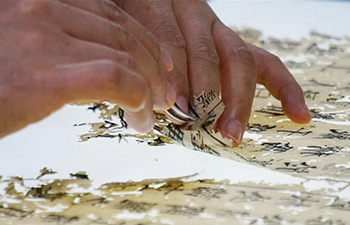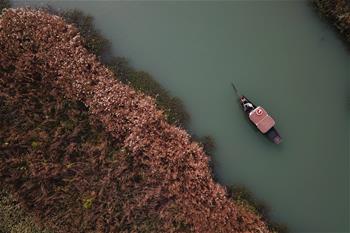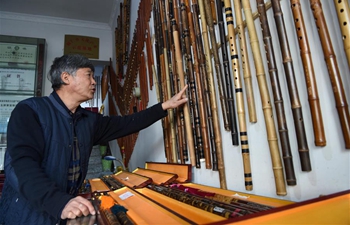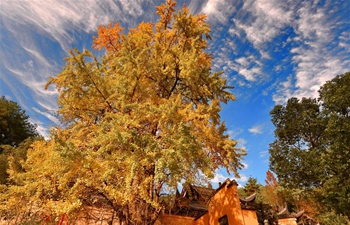ANKARA, Dec. 1 (Xinhua) -- As 2018, declared the "Year of Troy" by Turkey, draws to a close, the newly inaugurated museum built on the Troy archeological site proved to be a tourist magnet doubling the number of visitors to the mythical site.
The museum, inaugurated in mid-October, hosts some 2,000 works that have been unearthed in excavations, bringing light to the 5,000-year history of Troy.
The museum is located in the current Canakkale province in northwestern Turkey, on the mounds of Hisarlik overlooking the Turkish Aegean coastal plain.
Troy is a site immortalized by the Ancient Greek poet Homer, the poet of poets, in his mythical epics the Iliad and the Odyssey, known for its wooden Trojan horse. It is also a real-life archeological site.
Throughout the history, the Trojan war has been an inspiration to authors and poets.
Homer's works passed down from generation to generation, becoming part of the world's cultural history and one of the fundamental works in the European literature.
Many movies, including the 2004 Hollywood blockbuster Troy, starring Brad Pitt as Achilles, made the ancient site even more famous.
On the occasion of the 20th anniversary of Troy's addition to the UN Educational, Scientific, and Cultural Organization World Heritage List and the European Year of Cultural Heritage, this year is celebrated as the "Year of Troy" by Turkey.
Troy, Iliad and Odyssey are still a source of excitement and inspiration to millions of people all over the world and to those who come and see with their own eyes the location where archeologists said history happened.
Bulent Turan, a senior official of the ruling Justice and Development Party (AKP), who is a lawmaker from this region of Turkey, said that half a million foreign tourists have visited Troy since the beginning of 2018, which is more than double of the number of last year.
In three to five years, the number of tourists will reach 1 million, which is a boost for tourism and economy, the official was quoted as saying by the state-run Anadolu Agency.
"It's a unique experience. The architecture of the museum is inviting and it is as you feel yourself immersed in the ancient world of the Iliade and Odyssey," said Fabrice Wallargem, a retired Belgian school teacher, who recently made a trip to the museum.
The Troy Museum, with its 3,000-square-meter exhibition hall, hosts historical artifacts from Troy and Troia cities, including sculptures, sarcophagi, inscriptions, altars, axes and cutters, terra cotta pottery, metal vessels, gold pieces, weapons, coins, bone objects and tools.
Troy is especially considered as a historic cultural heritage for western civilization as Greek mythology is valued as a point of reference. Homer is a must read for school children in European nations.
"Troy has always been a place defining today's western civilization, a very important place immortalized in Homer's works which are thought in classes in Europe," Burcu Erciyas, archeology professor from the Ankara Middle East Technical University (METU) told Xinhua.
The experienced archeologist hailed the "Year of Troy" as an "honor" for the archeological academia but also added a note of frustration to the fact that neither the Iliad nor the Odyssey are incorporated in Turkish school curriculum.
The city was long thought to be purely mythical until the groundbreaking and controversial work of amateur archeologist Heinrich Schliemann, who began uncovering the site in the 1870s.
He later smuggled the treasures that he found to Germany via Greece.
Turkish officials hope that the year-long project would give impetus to efforts deployed in order to obtain the repatriation of Troy's treasures, which were smuggled and made their way abroad during the Ottoman Empire and the subsequent Turkish Republic, to the lands to which they belong.
Turkey is leading painstaking efforts for the return of plundered ancient artifacts from Anatolia, the cradle of many civilizations, over the past 200 years that now sit at museums and private collections across Europe and North America.
Experts believe that up to 200,000 items have been taken overseas.
There have been recent successes, such as the return of a Roman sarcophagus depictions of 12 labors of Hercules that had been smuggled from southern Turkey in the 1960s, but there is still a long and winding road ahead for Turkey's cultural detectives.
"It's problematic to get back artifacts which are now in museums abroad. Of course there is a big diplomatic struggle to retrieve them," said Erciyas.
Building a museum to host Troy's treasures can be a good argument, but nevertheless, it is still very difficult to obtain their return, Erciyas added.













